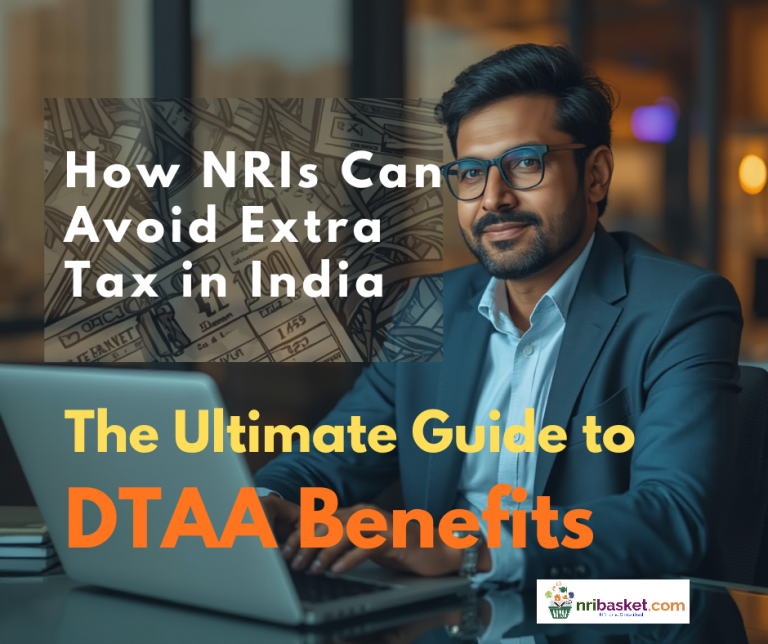
NRI-Property-Investment-in-India
For many NRIs (Non-Resident Indians), real estate in India is one of the most preferred forms of investment. Whether it’s buying a flat in your hometown, selling an inherited property, or planning a retirement home, understanding the rules, taxation, and legal aspects is crucial.
Step-by-step guide for NRIs buying property in India. Learn rules, documents, FEMA laws, taxation, home loans, power of attorney, and FAQs.
Not Allowed: Agricultural land, plantation property, or farmhouses (unless inherited or gifted).
Offficial link for all the steps at the end of the post
Following FAQ guide answers the most common questions NRIs have about buying, selling, managing, and repatriating property in India.
NRI Property Investment in India Complete FAQ
Long Answer: NRIs can buy residential and commercial properties in India. However, agricultural land, plantation property, and farmhouses are not permitted under FEMA rules unless inherited or gifted.
Long Answer: An NRI can freely buy apartments, houses, shops, or office spaces. Restrictions only apply to agricultural, plantation, and farmhouse properties unless received as inheritance.
Long Answer: Payments must come through Indian banking channels using NRE, NRO, or FCNR accounts. Direct foreign currency or traveler’s cheques are not allowed. NRIs are also eligible for home loans from Indian banks.
Long Answer: FEMA regulations prohibit NRIs from directly purchasing agricultural land, farmhouses, or plantations. However, they can inherit or receive them as gifts.
Long Answer: NRIs can sell residential or commercial property to Indian residents, other NRIs, or OCI cardholders. Agricultural land can only be sold to resident Indians.
Long Answer: Sale proceeds can be credited to NRO accounts. Repatriation is allowed up to $1 million per financial year, subject to documentation and taxes paid in India.
Long Answer: Buyers must deduct TDS at 20% (plus surcharge & cess) for long-term capital gains or 30% for short-term gains. NRIs can claim refunds or apply for lower TDS certificates from the Income Tax Department.
Long Answer: Many Indian banks and housing finance companies offer home loans to NRIs. Repayment must be through NRE/NRO/FCNR accounts or inward remittances, not in foreign currency.
Long Answer: NRIs can co-own property with resident Indians, other NRIs, or OCIs. The mode of ownership must comply with FEMA and taxation rules for each party.
Long Answer: NRIs often issue PoA to trusted relatives or representatives for property registration, leasing, or selling. It must be notarized abroad and registered in India for validity.
Long Answer: NRIs must pay local municipal property tax just like resident Indians. Non-payment can lead to penalties and recovery proceedings.
Long Answer: The Foreign Exchange Management Act (FEMA) governs what property NRIs can buy/sell, payment modes, and repatriation rules. Violations can lead to penalties.
Long Answer: NRIs can gift residential or commercial property to resident Indians, other NRIs, or OCIs. Agricultural land can only be gifted to resident Indians.
Long Answer: NRIs inheriting property in India must obtain a succession certificate or legal heirship proof. Proceeds from sale can be repatriated within FEMA limits after paying taxes.
Long Answer: A Permanent Account Number (PAN) is required for buying, selling, or registering property in India. It also helps in tax compliance and claiming refunds.
Long Answer: Rent earned by NRIs from Indian property is taxable. Tenants must deduct TDS at 30% before paying rent. NRIs can file returns to claim deductions or refunds.
Long Answer: While stamp duty and registration charges can be paid online in many states, physical presence or a valid PoA holder is usually required for the actual registration process.
Long Answer: Though not mandatory, insuring property protects against natural disasters, fire, and theft. Many Indian insurers offer NRI-specific property insurance policies.
Long Answer: If the spouse is an OCI, they can jointly buy property. If they are a foreign national without OCI, joint purchase is restricted and requires RBI approval.
Long Answer: Non-compliance with FEMA regulations can result in monetary penalties up to three times the property value, and the property may be seized by authorities.
Long Answer: NRIs can buy multiple residential and commercial properties in India. However, tax obligations and repatriation rules apply for each transaction.
More information on another post click here
Long Answer: For residential and commercial properties, NRIs do not need RBI approval. Prior approval is required only for restricted property types like agricultural land.
The above Faqs explain about NRI property investment India
,Can NRI buy property in India
,Rules for NRI real estate investment
,NRI property tax in India
,FEMA rules NRI property
,Can NRI sell property in India
,Inheritance property NRI
,Repatriation of sale proceeds India
,NRI home loan eligibility India
,NRI buying agricultural land India
,NRI real estate FAQs
,Property registration for NRI
,TDS on property sale NRI
,Power of Attorney property India NRI and
Property tax rules for NRIs India. Hopefully it answers your general questions if you still have any more questions please ask in comments and our experts will answer your queries and may feature your topic in next post.




